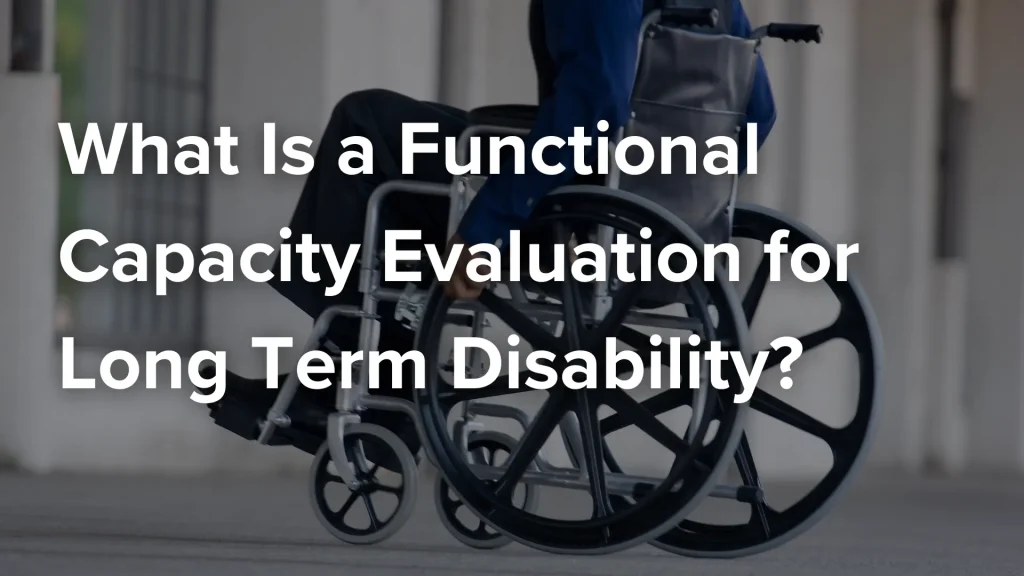Posted on Tuesday, April 8th, 2025 at 9:00 am
 If you’re applying for long-term disability (LTD) benefits in Pennsylvania, the insurance company may ask you to undergo a functional capacity evaluation (FCE). This evaluation can be crucial in determining your eligibility for LTD benefits, so you must take it seriously.
If you’re applying for long-term disability (LTD) benefits in Pennsylvania, the insurance company may ask you to undergo a functional capacity evaluation (FCE). This evaluation can be crucial in determining your eligibility for LTD benefits, so you must take it seriously.
However, FCEs aren’t always fair, and some insurance companies use them to deny claims unjustly. Understanding what an FCE is, how it works, and what your rights are is essential for protecting your rights and seeking the benefits you need.
What Is a Functional Capacity Evaluation?
A functional capacity evaluation is a series of tests administered by a medical professional, such as a physical therapist or occupational therapist, to evaluate the impact of your condition on your ability to work. While these evaluations are often used in workers’ compensation cases, they also play a critical role in many long-term disability cases, where determining the vocational impact of a condition is essential.
LTD needs insurance companies to use FCEs to determine whether your medical condition prevents you from working your pre-injury job or any other job where you meet the training and education requirements.
What Does a Functional Capacity Evaluation Measure?
FCEs assess your condition against various criteria to determine whether you can meet the physical demands of your job. Common areas FCEs test for include:
- Lifting and carrying capacity
- Sitting and standing tolerance
- Walking and stair-climbing ability
- Bending and flexibility
- Grip and hand strength
- Endurance and fatigue
Other tests, including cognitive assessments, may be included depending on your type of condition. For example, if you suffered from a traumatic brain injury, you may have trouble focusing, remembering, or problem-solving, which can impact your ability to work.
What Does It Mean to “Fail” a Functional Capacity Evaluation?
FCEs aren’t tests that you can pass or fail. They assess your ability to perform tasks related to your job based on the limitations imposed by your condition. However, insurance companies often treat the evaluation results as a pass or fail.
In this context, passing an FCE means the insurance company believes your condition doesn’t prevent you from being able to work, whether at your pre-injury job or in a different position. Failing an FCE means the insurance company accepts that your condition prevents you from working in any capacity.
Functional Capacity Evaluations vs. Independent Medical Examinations
Functional capacity evaluations aren’t the only tests the insurance company may ask you to undergo. They may also request that you undergo an independent medical examination (IME). But what are the differences between these two tests?
- FCEs assess your ability to perform tasks related to your work or other jobs you may be able to acquire.
- IMEs assess the nature and extent of your condition to determine your prognosis.
The easiest way to differentiate between these tests is that FCEs focus on the vocational side of your condition, while IMEs concentrate on the medical side.
Both tests can significantly impact the outcome of your LTD claim. It’s the kind of claim that needs to know details that help you prepare, so taking them seriously is essential.
Are Functional Capacity Evaluations Mandatory?
Depending on the terms of your LTD policy, your insurer may reserve the right to request you to undergo an FCE as part of the claims process. In this case, refusing the evaluation could result in your benefits being denied or terminated.
However, it’s crucial to remember that FCEs aren’t necessarily impartial or objective. Not all FCEs include the same tests. The physicians performing the tests may have biases. And the insurance company may interpret the results differently from the way you do. If you believe the FCE was unfair or the request from the insurance company was unreasonable, a disability attorney may be able to help you dispute it.
Please read more about supplemental insurance here: How to Choose Supplemental Insurance Options While Disabled.
How to Prepare for a Functional Capacity Evaluation
 Preparing for an FCE involves understanding your limitations and the purpose of the evaluation. Things to keep in mind when going in for an FCE are:
Preparing for an FCE involves understanding your limitations and the purpose of the evaluation. Things to keep in mind when going in for an FCE are:
- Be honest about your symptoms.
- Stop each test if you experience pain or discomfort.
- Clearly communicate your limitations with the evaluator.
- Dress comfortably and in something you can perform physical activity in.
- Bring any medical records requested by the evaluator.
Contact Our Long-Term Disability Lawyers
If the insurance company requests that you undergo a functional capacity evaluation to determine the impact of your condition on your ability to work, contact Capitan Law at (267) 419-7888 for a free consultation. Our team is here to help you understand your rights and take the first step toward securing the necessary benefits. One of our Philadelphia long-term disability lawyers in Pennsylvania will review the details of your case, explain your rights regarding FCEs, and answer any questions you have.
Related Post
What Is ERISA for Long Term Disability Insurance?
How Is long-term Term Disability Insurance Different From Health Insurance?